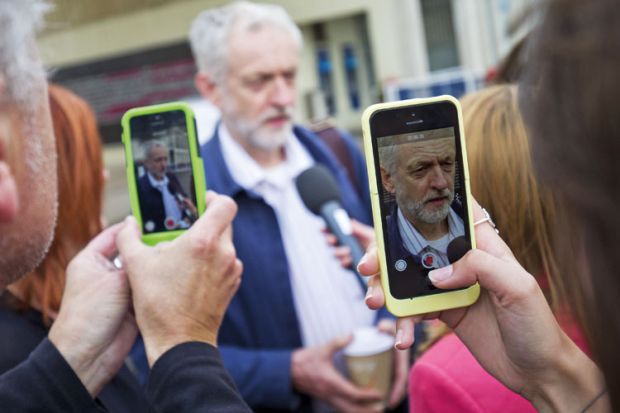The election of Jeremy Corbyn as Labour leader is a “gamble for higher education” given his policy to scrap fees, according to one sector observer, while left-wing student campaigners say that his win means that free education cannot be dismissed as “unimportant”.
The Islington North MP, announced as the winner of the ballot on 12 September, made a policy to abolish fees and reintroduce maintenance grants at a cost of £10 billion a year a central part of his successful campaign.
Mr Corbyn has appointed Angela Eagle as shadow business secretary, replacing Chuka Umunna. An announcement on the post of shadow universities and science minister, previously filled by Liam Byrne, had yet to be made as Times Higher Education went to press.
Nick Hillman, director of the Higher Education Policy Institute and a former Conservative parliamentary candidate, said: “If electing Jeremy Corbyn is a gamble for the Labour Party, it is also a gamble for higher education. His £10 billion commitment to abolish fees and revert to an early 1990s funding model would likely mean the reimposition of number controls, a hit on research funding and no spare money for other urgent priorities like part-time and postgraduate support.”
Mr Hillman suggested that government higher education policies may find themselves under less scrutiny if the opposition focuses on its fees policy. “There is a chance that Labour ends up looking like it’s playing a game while the Conservatives focus on governing,” he said.
“I realise [that] some people in the sector will think that is a harsh view, but no political party opposing fees has won an election in the lifetime of current sixth-formers and it seems unlikely that is going to change any time soon.”
Jonathan Simons, head of education at the right-of-centre Policy Exchange thinktank, said: “It's not at all clear how the plan for free higher education would realistically be funded – it uses a rise in corporation tax also pencilled in for other spending commitments.
“It also gives the biggest discounts to the highest earners – for example, someone earning £60K a year would benefit by about £3K a year.”
But a National Union of Students spokesman said of Mr Corbyn’s victory: “NUS believes that education should be publicly funded and welcomes the views put forward by the leader of the opposition on the prohibitive cost of higher education.”
And James Elliott, of the National Campaign Against Fees and Cuts national committee, said: “It is great to see a Labour leader elected who believes in free education and progressive taxation. The higher education sector will no longer be able to dismiss these ideas as unimportant and unrepresentative.”
Mr Corbyn was the only one of the four leadership candidates not to have attended the universities of Oxford or Cambridge, having started a course in trade union studies at North London Polytechnic, although he did not graduate.
后记
Print headline: Corbyn win: a red flag for policy?




